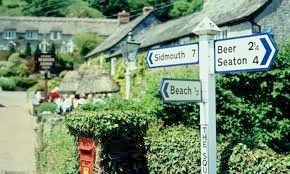Consider the names of things. For example, the names that people choose for their children. When my brother and sister-in-law were expecting their oldest son, the family was asked to put forward helpful suggestions for names. This was not a success: my father responded that he had cast his vote when my brother and I were named and had no further comment to make, and I suggested that, since the baby would be of mixed Indian and British heritage, they could name the baby Sujoy, thereby creating a real-life boy named Sue1. Or consider the names of small English towns. These are the basis of an excellent car game for long journeys through rural areas, called Let's Move To ... The aim is to find the most intriguing name of a real place by perusing either road-signs or maps, which you could reach by making a small deviation from your intended route if you so chose (although you don’t need to actually go there. That would spoil it). You win points by pronouncing the name of your chosen town or village correctly (according to the consensus of those in the vehicle); speculating in an interesting fashion as to what the town or village might be like; fanciful descriptions of the origins of the name; and, finally, making your case for everyone in the car to move there. I grew up in Cornwall, which has so many eccentrically-named villages that the game can go on for several hours. These include Woolfardisworthy, Goonhilly, Gweek, Herod's Foot, Broadwoodwidger and (my favourites) Splat and Hatt. This made it a more difficult game to play than you might think, because of course we all knew what these places were really like2.
The names of recipes are particularly intriguing. So many recipe names are not so much names as lists of the ingredients used and procedures followed, as if people were to name their children by simply adding their own names together (‘Mostly Phil, with a glaze of Felicity’ or similar), but the exceptions are so much more interesting. For example, Upside-Down Cake. This name is predicated on the idea that at some point a committee of unparalleled dullness was formed, and everybody agreed which part of the cake was going to be designated the top, and which part the bottom, and that if you chose to serve the cake with the bottom part uppermost, that was just a little bit kinky and ought to be pointed out to the unwary. British puddings in particular are riddled with this sort of thing. There is no consensus, for example, on the origins of the names of the Queen of Puddings, Apple Charlotte or Spotted Dick. According to the internet, this last is also called Spotted Dog3 if you make it with plums (I’m not making this up). The creators of older recipes seem quite refreshingly unashamed about the link between food and sex. Philippa Pullar’s seminal work Consuming Passions originally had a picture on the front cover of a loaf of bread baked in the shape of a tremendous penis4, for example. The cover of my copy features nothing naughtier than some slightly tipsy ladies in a dubious shade of pink, but I expect the more explicit 1977 originals are worth a bit. That rather lovely frankness seems to have coarsened with the passing of time. Without even trying, I found several examples of sex-related food on the internet, none of which I wanted to try. This included F-cup tea, which supposedly contains herbal extracts that will increase the size of one’s bosoms (or possibly shrink the bosoms of those of us already larger than an F-cup) and a website dedicated to recipes that include breast milk5.

My favourite oddly-named pudding at the moment is Eve’s Pudding. It’s as simple as it is delicious, consisting of a layer of cooking apples underneath a sort of biscuit-sponge lemony topping. I found a few recipes online, but I haven’t linked to any of them as none are as good as the one in my elderly Good Housekeeping cookbook, which advises you to substitute some of the flour for ground almonds and scatter flaked almonds on top. I also recommend deliberately taking it out of the oven early so that the cake part is still gooey in the middle. We have eaten two Eve’s Puddings in the last few days and will no doubt be eating many more this winter in an attempt to cope with the massive glut of apples produced by our tree. Last summer we had a fairly modest crop, most of which we left on the ground for the hedgehog in the hope of dissuading him from digging in the herb garden6 and when he went into hibernation, we left what remained for the fieldfares as it was such a hard winter. The tree is enormous, probably fifty years old, and it dominates the garden. It has never been pruned and most of the fruit is therefore produced well out of reach and has to be harvested as windfalls, or using my patented lawn-rake-strapped-to-a-stick method, which doesn’t work. The falling apples vary in size and weight, but so far I have observed a severely concussed cat (this was brilliant as it is a boot-faced goblin that leaves horrible crusty cat-turds in the vegetable patch); a traumatized squirrel (the deadly fruit whistled past and thumped into the grass between its paws with no warning whatsoever); and two broken panes of glass in the greenhouse. This last happened in the middle of the day while I was at home on my own, and it scared my doublet and hose off. I found the apple rolling innocently around on the concrete floor, barely dented. If I tried to kill a squirrel or brain a cat armed only with apples, I doubt very much that I could do so, and yet the tree, immobile, blind and in no way sentient, has had a jolly good go at both.

Gardeners' Question Time attempted to give the impression that my apple tree was not special: apparently it has been an unusually productive year for all fruit trees. However, in the case of our tree, I submit that the real cause was our Applefest party, which we threw in chilly early spring. My husband (you can read his plant-based blog if you promise not to think less of me because I am frightened of insects larger than any insect has a right to be) did some research into Somerset wassailing traditions. These included tying toast to the tree, singing ‘Ye Gentle Men of England’ in an inaccurate but harmonious fashion, reciting incantations to the tree exhorting it to be fruitful, and lifting the smallest person present into the tree to splash cider on it and light firecrackers. This was all a resoundingly silly success (as the Guardian says, a decent wassail 'sounds silly, but then most things that are best for the human spirit do'). We only narrowly avoided setting the tree on fire and I can forever treasure the memory of my beloved church choir casting Tallis and Bruckner aside in favour of a pagan ceremony that was probably written by a drunk. Now, however, the forty pounds of produce in my larder tell a cautionary tale to the would-be wassailer. I am eating apples for breakfast7; I am spending a small fortune on kilner jars; I have preserved more fruit than we can possibly hope to eat; and still there are more apples roosting in the branches.
According to some of the quince-related trivia I read while trying to work out what on earth quince jelly was and whether it was worth the hours of stirring, chopping and straining through muslin for a meagre five pounds of jelly (it was), I discovered that, even though you can't make marmalade with quinces, nonetheless the word 'marmalade' is derived from the Portuguese word for quince, which is marmelo (supposedly the word marmelada, meaning quince jam, was misappropriated), and that although words very similar to our word 'marmalade' and probably derived from the same root are used all over continental Europe to refer to jams and preserves generally, because Britons use the word to mean specifically and exclusively those preserves made with citrus fruits, the EU insisted on spreading this usage across a bunch of other countries, to general spluttering. Best of all, I found out that some people believe that the fruit of the tree of knowledge of good and evil was not an apple at all, but a quince8. In other words, either we have been making Eve's Pudding all wrong, or it has no right to call itself Eve's Pudding.
1 I know there would probably have been consequences for the poor little chap (now named Ben and probably living in youthful ignorance of Johnny Cash and all his works), not all of them good. I had in mind those fairy stories where the magical godmothers gather around the cot and list all the nauseating characteristics that they hope the baby will grow up to have. My metaphorical gift, better than all the enchanted swords and friendly woodland folk in the world, would have been a trump card for my nephew to play in any argument with his father (FATHER <flings down newspaper>: What time do you call this?; CHILD <sneers>: Mah name is SUE! How do you DO? NOW YOU GONNA DAH! <fight ensues>).
2 Hatt, for example, is a charming little place where my mother liked to go out for dinner. It is also just down the road from Botusfleming.
3 I can’t say that either name makes me eager to put the thing in my mouth, which you would have thought was the only criterion.
4 It was subsequently withdrawn <pounding of desk>. See also my previous post House of Holes and the coining of the brand new super-word ‘wonderloaves’.
5 Apparently ‘breastmilk can readily be substituted for anything that calls for milk’. I would have preferred ‘substituted in anything’ (my italics), but we’ll let it go since I’m not being paid. I would also like to think they might make an exception for something requiring large quantities of milk: rice pudding takes long enough to make already.
6 It didn’t work: nothing can dissuade him from digging up my plants. I have tried hand-feeding him cold sausages, but he simply pauses, eats the sausage and goes back to his digging. Hedgehog fail.
7 Stewed with a little bit of brown sugar and then sprinkled with granola.
8 Not convincing: raw quince is horrible. The serpent could have tempted pretty much anyone with the sunset in a jar that is quince jelly, but Eden is unlikely to have provided the necessary materials i.e. a jam pan, a wooden spoon, lots of sugar, a piano stool and a bolt of muslin.
